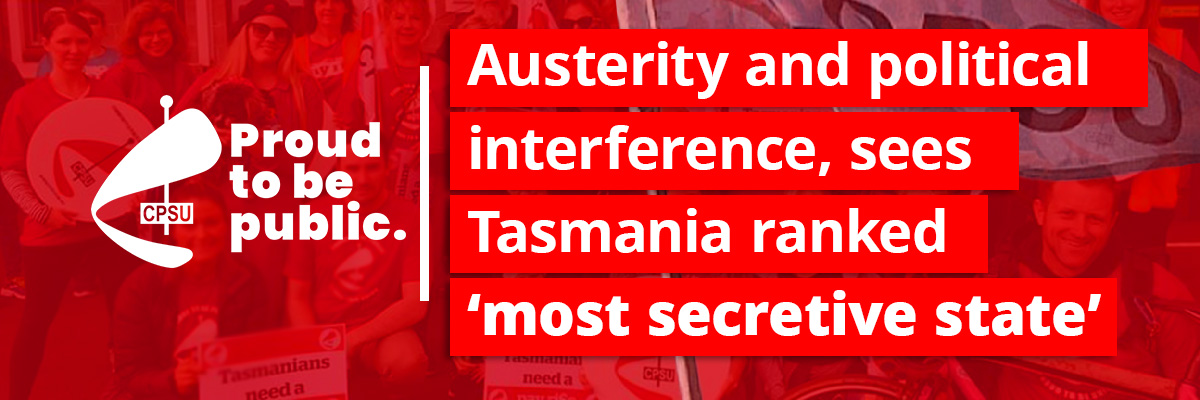
At least 70% of Tasmania’s right to information (RTI) decisions that were challenged and referred to the Ombudsman were subsequently overturned, either in full or in part, in four of the past five years.
A new report, published by the Environmental Defenders Office, reveals that Tasmania has the highest rate of refusal and rate of error in the country. Tasmanians are more likely to have their freedom of information denied than anywhere else in Australia.
They’ll also be forced to wait longer than almost anywhere else for review. The average time it takes to challenge the decision of a public authority by seeking an external review by the Ombudsman is now 987 days, almost three years. This is up from an average 230 days in 2016-17. As a result, what information does eventually make it into the public domain is frequently no longer relevant.
Your union regularly makes RTI requests on behalf of members and has witnessed this trend firsthand. Currently the CPSU is seeking disclosure on the application of market allowances amid our current recruitment and retention crisis, as well as agency-by-agency data from the recent Tasmanian State Service Employment Survey.
Agencies were found to routinely misinterpret the RTI Act in assessing applications, leading to up to 70% of refusals being overturned on review. Over the reporting period, agencies misapplied the Act in nearly every decision reviewed by the Ombudsman.
NRE consistently ranked in the top 3 worst performing agencies for the number of its RTI decisions subject to external review requests between 2017 and 2022. During this period, exactly none (you read that right: 0%) of the Department’s decisions were upheld in full upon review. All in all, only 1 in 20 decisions reviewed by the Ombudsman in 2019-20 were affirmed.
There has been no additional funding for external reviews over the past ten years, despite the steady increase in reviews in response to a clearly disproportionate refusal rate. If the Rockliff Government is looking for efficiencies in our public sector, requiring Heads of Agency to read the RTI Act could save the Ombudsman significant expense.
It’s a shocking trend which has progressively worsened since Tasmania’s Right to Information Act was passed in 2009. Over the last five years of Liberal government, it has entered something more resembling a death spiral.
In 2016-17 agencies refused access to any information in 15% of cases. In 2018-19 it reached 30% of cases; nearly double the refusal rate of the next highest jurisdiction (Queensland, at 16%) and 750 times that of Victoria and the NT (4%).
As the report shows, the current administration of the Act ensures that arbitrary and bad faith rejections are almost guaranteed. This includes the “preliminary decision” process which gives agencies and Ministers additional prompting, but no time limit, to challenge decisions which they might consider adverse. This only contributes to an ever-growing backlog for staff in the the Ombudsman’s Office who are already stretched to their limits.
The report calls for a “substantial funding increase to the Ombudsman’s Office with a focus on recruiting more staff at the senior level to expedite RTI decision making, and work through the growing backlog.” But as it also clearly shows, without review and amendment of the RTI Act to prevent misadministration, their workload will continue to be bloated by arbitrary and bad faith refusals intended to hinder public access to information which could generate bad headlines for a Government clearly obsessed with them.
The report’s 12 recommendations include:
- Amending the Act to include an explicit presumption that all information sought be disclosable unless the public authority is satisfied that it falls into a category of exempt information and that it would be contrary to the public interest to disclose it;
- Further amendments to alter the prescribed window for external reviews from, “as soon as reasonably practicable” to 30 days in line with other jurisdictions;
- An independent review of existing exemptions to highlight necessary reforms for those most commonly misapplied;
- Providing the Tasmanian Civil and Administrative Tribunal jurisdiction over external reviews alternative and/or consecutive to reviews by the Ombudsman or Information Commissioner, as in other jurisdictions;
- Funding for the Ombudsman’s Office to train public authorities in the appropriate application of the Act and the public interest test.
Tasmanians are fed up with public sector austerity and the continued erosion of transparency and integrity. But far from addressing these resourcing issues, Premier Rockliff is pushing ahead with upwards of half a billion dollars of public sector cuts announced in this year’s budget. While the Premier has repeatedly promised these cuts won’t affect the “front line,” he pointedly refused during Budget Estimates to define where that line is. Our Ombudsman, like many of our critical services, is already stretched to their limits after years of public sector austerity.
Politicians famously fear having their decisions held up to the standards of the pub test. Strangling, through chronic under-resourcing, the institutions intended to protect Tasmanians’ right to know what decisions are being made, is like solving the problem by demolishing the pub.
(1) “The object of this Act is to improve democratic government in Tasmania –
- by increasing the accountability of the executive to the people of Tasmania; and
- by increasing the ability of the people of Tasmania to participate in their governance; and
- by acknowledging that information collected by public authorities is collected for and on behalf of the people of Tasmania and is the property of the State.”
(4) “It is the intention of Parliament –
- that this Act be interpreted so as to further the object set out in subsection (1);
- and that discretions conferred by this Act be exercised so as to facilitate and promote, promptly and at the lowest reasonable cost, the provision of the maximum amount of official information.”
Read more:
Environmental Defenders Office report: Transparent failure: Tasmania’s ineffective right to information system and how to fix it: https://www.edo.org.au/wp-content/uploads/2023/07/EDO_RTI_Act_report_web.pdf
AAP: Tasmania trashed as ‘Australia’s most secretive state’: https://www.canberratimes.com.au/story/8259298/tasmania-trashed-as-australias-most-secretive-state/
ABC: Tasmania 750 per cent more likely than others to refuse Right to Information requests – is it Australia’s most secretive state?: https://www.abc.net.au/news/2020-11-18/tas-right-to-information-secretive-state/12897316







